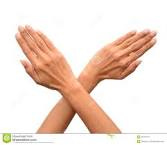Call me a bit cynical but I have always thought the idea of one person blessing another person was a bit of a reach. Do we, mere flesh and blood, really have the power to bestow blessing on another human? In Jewish communities, this tradition has deep roots. When a person is preparing to get married, there is a belief that they have the extra ability that day to offer blessing to those they meet before the chuppah. On a person’s birthday, some believe they have been given a temporary wellspring of blessing to offer. And of course, the blessing of the children that takes place on shabbat evening.
I was never fully convinced but having recently become a parent, that one has been on my mind. Neither Lauren nor I grew up in homes where children received blessings. So as we began the conversation around what our practice might be, my aforementioned skepticism reared its head. As is often the case, my significant other helped soften some of my more harsh tendencies and we explored the concept with open eyes and open hearts.
When we bless our sons to be like Ephraim and Menashe, we turn to this week’s parshah, Vayechi, for its source. “By you shall Israel invoke blessings, saying: God make you like Ephraim and Manasseh.” The problem, as many of you know, is that Ephraim is the younger child so why does he get the blessing and why do we invoke this particular moment to bestow blessing on our children?
Many answers have been offered over the centuries but one that I came across as we investigated this question for our family spoke to me this year. Rabbi Tzvi Elimelech Spira of Dinov connects this blessing to the teaching from Pirke Avot (4:21) that “jealousy, desire, and honor remove a person from this world.” According to Rabbi Spira, Jacob is attempting to teach a lasting lesson about jealousy and pride.
After all of the infighting, morally dubious choices, and bloodshed of the book of Bereishit, Jacob makes a conscious decision to end things on an aspirational note. By switching his hands intentionally, he’s offering a lesson to Ephraim and Menashe and ostensibly to us every Shabbat. In the words of the Rebbe of Dinov, when he sees their positive response in not fighting one another, they merit to have a blessing performed in their name for all time. That blessing is that “God will bless you to live without becoming overly prideful for the blessings you receive and to not hold jealousy in your heart for the goodness of your fellow.”
When I read this and discussed it with Lauren, it felt like a beautiful way to frame this particular moment of blessing in our own lives. It’s not that you’re changing the fabric of the universe with the gift of blessing someone else. Rather, you’re offering them a hope and a dream that they infuse their life with that particular intention. In a world in which we still see so much covetousness and hate between humanity, we want our children to strive for something better. We all want our children to feel content both in what they are blessed to receive AND to work hard to make sure there is enough for others. That gives my cynicism a break for one night!
May we all continue to live with the legacy of Ephraim and Menashe and see it made manifest in the generations to come!
Shabbat Shalom and Happy Weekend!




Very insightful, as always. But may I point out something I disagree with you on. Actually, you left out an important word early on when you said: "Neither Lauren nor I grew up in homes where children received blessings." That word is "formal". You two may never have received formal blessings, but you two, were, hopefully and likely, brought up in good, stable homes with love. To me that is a blessing given by your family even if they are not putting their hands on your heade. And this is not to be taken for granted (of course, all families have issues; none are perfect. But, hopefully, your upbringings had love and purpose).
B'shalom,
Marc Karell